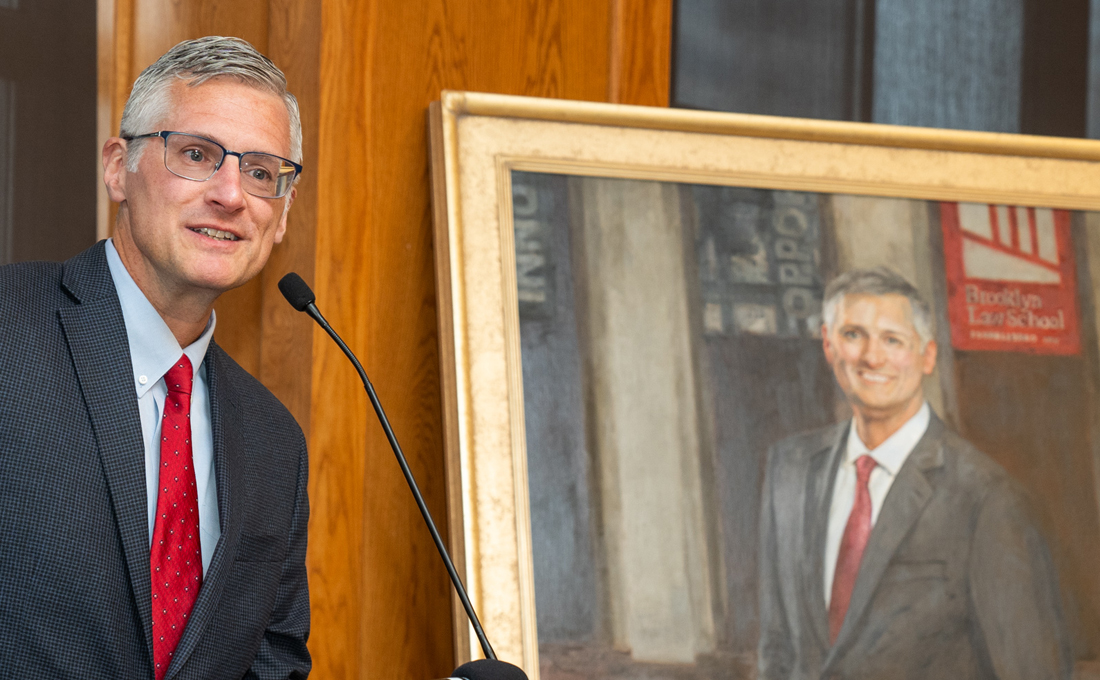Community Celebrates Michael Cahill, Emeritus President and Dean, at Portrait Unveiling

A new portrait to honor Michael T. Cahill, Emeritus President and Joseph Crea Dean, was unveiled at a celebratory luncheon at the Subotnick Center on Jan. 30, where many of his faculty colleagues described him as a cherished friend and recalled how he led Brooklyn Law School adroitly and gracefully through the pandemic.
Cahill served as Dean from July 2019 through June 2023, and was a faculty member from 2003–2016, during which time he also served as Vice Dean (2013–15) and as Associate Dean for Academic Affairs (2010–13). After relinquishing his deanship at the end of Spring 2023, he rejoined the faculty in Fall 2023 to teach Criminal Law and Property Law.
The portrait of Cahill was painted by artist Linda Tracey Brandon, whose portraits commissioned by Brooklyn Law School also include those of former longtime professors, as well as previous deans Nicholas Allard (2012-2018); Joan Wexler (dean and president, 1994-2010); and David Trager (1983-1993).
Preceding the unveiling, President and Joseph Crea Dean David D. Meyer and fellow professors took the time to express their gratitude to Cahill for his leadership and friendship.
Meyer spoke of following Cahill’s deanship from afar and being impressed with his accomplishments, including his success in enhancing faculty, with 18 full-time appointments, expanding the school’s commitment to diversity and inclusion, creating innovative programs, and his commitment to excellence, “amid the biggest curveballs that could be thrown with Covid, which was compounded by facilities challenges.”
Vice Dean and Centennial Professor Miriam Baer spoke of Cahill being “a beacon for junior faculty” and of his unflappable nature amid the challenges of the pandemic. Speaking to Cahill, Baer said, “If there is a theme that describes your tenure throughout each of these time periods, it is this: You have always taken on these roles not for the status but for the service. You care about this school, about the students who come here seeking to become lawyers, about the staff and administrators who make that transformation possible, and about the professors whose teaching and scholarship fueled this Law School's mission. Your service is a model for others.”
Professor Christina Mulligan, who served as vice dean from 2019 to 2022, also lauded Cahill’s extraordinary ability to build and maintain within the Law School amid what she termed his “wartime deanship.”
Centennial Professor of Law Dana Brakman Reiser, who fondly recounted the close friendship she and her family formed over the years with that of Cahill and his wife, Rosalyn Scaff, and their children added, “I couldn't imagine anyone who could steer the ship with so much aplomb.”
David M. Barse Professor of Law Edward Janger, who is both a colleague and former running partner of Cahill’s, described former marathoner Cahill as someone who “has always played the long game.”
“Michael would walk the halls; he knew what everyone was doing in their scholarship. He gave short, insightful comments that made our work better. And … he was someone to help provide the glue that kept us all together during difficult times,” Janger said.
Additional kind words came from Professor Michael Gerber, who was interim dean when Cahill was vice dean, and then worked with him again when their positions reversed, with Cahill as dean and Gerber as vice dean of research and scholarship.
“In all of the contexts in which we work together,” Gerber said, “Michael has demonstrated—and this has been said before, but it bears repeating—incredible grace and equanimity.”
Following the unveiling of the portrait, which features Cahill standing before the façade of the Law School, Cahill took the podium. A passage from a poem by John Ashberry, he said, spoke to him during his deanship: “Tomorrow is easy but today is uncharted/Desolate, reluctant as any landscape/To yield what are laws of perspective…” Amid those uncharted days of the pandemic, Cahill said, looking forward felt more positive at a time when “one didn’t always feel that it was something from which we would ever emerge.”
Speaking of the successes that occurred even amid the hardship of those years, Cahill added, “During my time as dean, what I know is that whatever those handful of things might have been, none of them would have been possible without the hard work, the support, the ongoing dedication, and maybe most of all the good cheer of all the people in this room, the faculty and staff of this institution that kept it running every day, even when the days were unsure and desolate. I want to share my deep appreciation and gratitude for having been given that daunting and weighty but ultimately rewarding opportunity to serve this institution in the many ways that I have, and it was certainly made easier, a hard job was made much easier, by the people in this room. So, I want to thank you.”